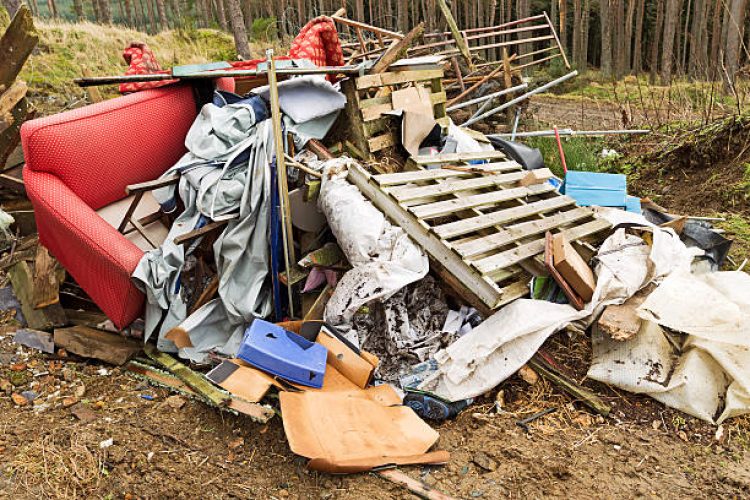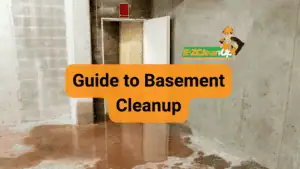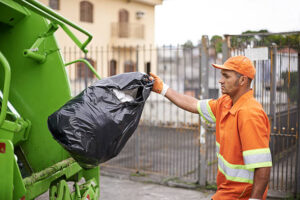Illegal dumping is a growing environmental crisis that affects communities across the United States, costing millions in cleanup efforts while posing serious health and safety risks. Whether you’re a homeowner, business owner, or contractor, understanding what constitutes illegal dumping and how to avoid it is essential to protect yourself from hefty fines and criminal charges.
What Is Illegal Dumping?
Illegal dumping refers to the unlawful act of disposing of trash on private or public land where doing so is not permitted, including discarding items like appliances, tires, household garbage, construction debris, autos and yard waste. The definition varies by state, but usually involves dumping waste on public or private property that is not licensed or permitted to receive waste, dumping waste without a license or permit into sewers or waterways, or allowing another to dump waste on one’s land without being licensed to receive such waste.
Illegal Dumping vs. Littering
States often distinguish between littering and illegal dumping based on the type and volume of waste, with dumping a larger volume of household waste, such as bags full of garbage or an old refrigerator, constituting illegal dumping.
Severe Penalties For Illegal Dumping
The consequences of illegal dumping can be financially devastating and may include criminal charges. Penalties vary by state and the amount of waste dumped, but they are designed to serve as strong deterrents.
Federal and State Penalties
For misdemeanors, the fine may be as little as for a traffic ticket, but for felonies, fines can add up to thousands of dollars, with some fines accruing daily until the illegally dumped waste is cleaned up.
California Penal Code 374.3 makes dumping waste on public or private property illegal, with fines up to $10,000 from the state. Dumping less than fifteen pounds is a misdemeanor leading to a two hundred-dollar fine or 30 days in jail for the first or second offense, while fines in California can reach $3,000 for a third or subsequent conviction and be doubled for dumped tires or tripled for commercial waste.
Commercial Dumping Carries Harsher Penalties
Commercial waste dumping starts between $1,000 and $3,000 for the first offense and up to $10,000 for subsequent offenses, while business owners with ten or more employees face fines ranging from $1,000 to $5,000 for the first offense and up to $20,000 for additional offenses.
Jail Time and Additional Consequences
Individuals guilty of illegal waste dumping may face imprisonment for up to six months. Beyond fines and jail time, violators will be responsible for the expenses involved in removing the waste.
Environmental and Health Impacts of Illegal Dumping
The consequences of illegal dumping extend far beyond legal penalties, creating serious environmental and public health hazards.
Soil and Water Contamination
Hazardous waste dumped illegally can seep into the soil, leading to severe contamination as toxic substances such as heavy metals, chemicals, and solvents can penetrate the ground, rendering the soil infertile and unfit for agriculture. Runoff and hazardous waste can work its way into streams, rivers, lakes and drinking water.
Public Health Risks
Sites where trash is just sitting out are a breeding ground for insects like mosquitoes and flies, and animals that carry diseases like rats, skunks and opossums, with diseases including dengue fever, yellow fever, encephalitis and malaria. Short-term issues include asthma; congenital illnesses; stress and anxiety; headaches, dizziness and nausea; and eye and respiratory infections.
Air Quality Degradation
Burning illegal waste, a common practice, releases harmful pollutants, including dioxins and furans, which can cause respiratory diseases, skin conditions, and other health problems.
Economic Impact on Communities
The City of Camden reported spending $4 million a year responding to illegal dumping and removed 7,000 tons of illegally dumped material in 2019 alone. These cleanup costs divert funds from essential community services and burden taxpayers.
How To Avoid Illegal Dumping: Practical Solutions
1. Use Proper Disposal Channels
Contact your local trash pickup service for information on bulk trash pickup and to schedule a pickup time. Most municipalities offer designated disposal options for various materials.
2. Utilize Legal Disposal Facilities
If your local trash collector won’t accept certain materials, you can take your waste directly to your local landfill or household hazardous wastes processing facility. The United States Environmental Protection Agency recommends disposing of household hazardous and toxic waste in the nearest community drop off location.
3. Transport Waste Safely
Do not transport unsecured debris in the back of a vehicle, always use a tarp or other cover. This prevents accidental littering and demonstrates proper waste management practices.
4. Take Advantage of Community Collection Events
Cities should provide clear guidance for how to legally dispose of trash and debris, and consider hosting community-centered events like dumpster roll-offs and hazardous waste and e-waste collection days where residents can easily dispose hazardous materials.
5. Educate Yourself and Others
Educate the public through the schools and through community awareness groups about the costs, chemical hazards and dangers incurred by illegal dumping. Spread the word to friends, neighbors, and other citizens that illegal dumping is a crime.
How To Report Illegal Dumping
If you witness illegal dumping activity, reporting it promptly is crucial:
Take note of the incident’s location, time, and date, take photographs or videos of the dumping activity, the waste, and any vehicles or individuals involved, and contact local authorities by reporting the incident to your local environmental protection agency, waste management department, or the police.
Key Information to Gather
When reporting illegal dumping, collect as much detail as possible:
- Exact location of the dumping site
- Date and time of the incident
- Description of the waste materials
- Vehicle description and license plate number
- Physical description of individuals involved
- Photos or video evidence
Preventing Illegal Dumping on Your Property
Property owners can take proactive steps to deter illegal dumping:
In Flint, dump sites were cleaned up and had boulder barriers, solar lighting, and trail cameras installed. These physical deterrents make it difficult for dumpers to access and use the property.
Cleaning up existing illegal dumps is a helpful deterrent for additional illegal dumping. People are less likely to dump in clean areas.
The Bottom Line
Illegal dumping is a serious crime with severe financial, legal, and environmental consequences. By understanding what constitutes illegal dumping, using proper disposal methods, and reporting violations, we can all contribute to cleaner, healthier communities. The cost of legal disposal is minimal compared to the thousands of dollars in fines, cleanup costs, and potential jail time that illegal dumping carries.
Remember: When in doubt about how to dispose of waste properly, contact your local waste management authority or environmental protection agency. They can provide guidance on legal disposal options and help you avoid costly penalties.












